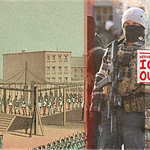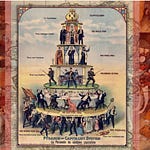Hello Interactors,
It’s hard to miss news about global supply chain woes these days. Between Covid, natural disasters, and strained trade relations with China it seems unlikely we’ll see anything that looks like normal for some time. But companies aren’t waiting to find out. They’re taking matters into their own hands. Or so they think.
As interactors, you’re special individuals self-selected to be a part of an evolutionary journey. You’re also members of an attentive community so I welcome your participation.
Please leave your comments below or email me directly.
Now let’s go…
MARIA CANTWELL AND THE CHAIN GANG
“There are some people who are saying, ‘Look, what I need is short term because this is never going to happen again,’ ” she said. “Then there are other people who are saying, ‘This is going to happen more often than we think.’ The world is a very different place, and it’s not just the pandemic. It’s natural disasters. It’s the floods down in the South. It’s tornadoes, it’s hurricanes.”
These are the words of Ellen Kullman.1 She’s the CEO of Carbon Inc., a 3-D printing company. She’s also the former CEO of DuPont, sits on the board of directors for Goldman Sachs and Dell, is a member of the National Academy of Engineering, a recognized leader in global science and engineering, and once chaired the US-China Business Council.
She knows a thing or two about global supply chains; which have had their fair share of attention recently. As global corporations have pushed their employees to work Harder, Better, Faster, and Stronger. They must appease shareholders demanding perpetual growth, even at the cost to people and the environment. To do so, they rely on other parts of the globe for raw materials and labor – a spatial fix.
Covid has taken a 200-year capitalism strategy believed to be immune to disruption and has created a supply chain pandemic. Just as the disease is testing our body’s immune system, it’s also testing the resiliency of networked global supply chains.
The onset of the pandemic showed early signs of vulnerability when global corporations were hit by governmental restrictions. Without notice borders around the world were closed, lockdowns prevented employees from working, and no sooner were facemasks recommended did we run out of supply. Dr. Gary Gereffi from Duke’s Global Value Chains Center said,
“China accounted for about 60% of U.S. face mask imports prior to the pandemic, but China suspended its exports of face masks worldwide as it dealt with its own outbreak of COVID-19 cases in early 2020.”2
It wasn’t until late August that the supply gap was filled by U.S. producers.
Gereffi was testifying on July 15, 2021, in a hearing chaired by Democratic U.S. Senator Maria Cantwell on “Implementing Supply Chain Resiliency.” The meeting was in reaction to one of Biden’s first executive orders. It launched a 100-day review identifying vulnerabilities in the nation’s supply chains and how to address them.
The witnesses in the hearing included Gereffi from academia and five others from government agencies and the business sector. Their testimonies paint an accurate state of the country’s complicated over reliance on the global supply chain. They also had asks of the government that you might expect; more government funding, private-public partnerships, subsidies, or for the government to get out of the way. Or, in the case of Lex Taylor, a confusing mix of all the above.
William A. (Lex) Taylor III runs The Taylor Group of Companies, Inc. It was founded in 1927 as Taylor Machine Works in Louisville, Mississippi. Did I mention the ranking member and co-chair seated alongside Cantwell was U.S. Senator Roger Wicker, a Republican from Mississippi?
The Taylor Group is now a privately held holding company for Taylor Machine Works (heavy industrial forklifts), Taylor Power Systems (power generators), and Taylor Defense (remanufactured military material).
Taylor complained about the lack of resiliency in the global supply chain. He said the Association of Equipment Manufacturers (AEM) had quickly come up with a plan for how to circumvent the Covid caused supply chain conundrums called operation “Floorplan”. It was modelled after what he deemed a “successful Payroll Protection Program the Congress instituted at the Small Business Administration.” A clear nod to a government success story by a devote capitalist.
But he claimed operation “Floorplan“ failed “because of the political wrangling and failure of the government to understand the big-picture consequences of letting supply chains falter.” Yet the association seemed ok asking the government to bankroll his “Floorplan” program.
He went on about how every private company involved in his vast and deep supply chain began raising their prices to control their limited and dwindling supplies – a tried and true trick of the free-market system.
Compounding inflation among suppliers forced him to ultimately raise his prices too; all the while trying to stay afloat. He said, “we have kept our lines running but are facing 30% to 75% price increases either from our vendors or the transportation companies, or a combination of both.”3
What gouged him the most was unbridled free-market pricing; a practical solution driven by the private sector. At the same time, he wanted federal dollars to fix the problem with a government subsidized “Floorplan.”
But while he and his employees benefitted from the government run Payroll Protection Program – and he wished the federal government would have funded his “Floorplan” – he would rather the free-market solve his problems. Even though the free market created the bulk of his financial pain.
In his closing remarks he said,
“My request is that this committee not act to overcorrect with solutions that may cause unintended consequences. Rather, I encourage you to support the free-market system and allow it to do what it does best and find solutions that are practical and driven by the private sector.”
Price gouging is a practical mechanism of the free-market. A solution? Maybe not.
BOEING BOEING GONE
In her opening remarks, Maria Cantwell said, “I would say, Senator Wicker, I'm not sure 20 years ago, if we would've had the same hearing.”4
Twenty years ago Cantwell was in her first year as a U.S. Senator. Amassing independent wealth from her time in the software industry, she threw a lot of her own money into her campaign against the eleven year incumbent, Republican Slade Gorton. Microsoft was her biggest donor, followed by two law firms, and the fourth largest campaign contributor was Boeing.

Six months later Boeing sought their own spatial fix and announced they were moving their corporate headquarters to Chicago. By September of 2001, after being headquartered in Seattle since 1916, the Boeing corporate offices fell vacant.
Eight years later, in 2009, after the 2008 financial crisis, Boeing applied another spatial fix moving an assembly plant from Washington to South Carolina. North Charleston’s economy had been devastated by the closure of a naval shipyard and the Great Recession. They were experiencing record high unemployment rates.
So the state offered Boeing an incentive to move their factory. If Boeing could create 3,800 jobs and invest $750 million over the next seven years, the state would pitch in another $450 million.
Boeing had already been dealing with ugly union strikes in Washington. Four of their last seven contract negotiations ended in strikes. Conservatives blamed the machinists while liberals blamed Boeing. Either way, South Carolina was union free. An unorganized labor force is attractive to corporations because they can dictate the terms of pay uncontested. Some states, and nations, will even suppress or ban unions in hopes of attracting businesses to their regions.
Frank Larkin of the Association of Machinists and Aerospace Workers said in 2009, “It became clear early on that the company was less interested in making a deal than they were in getting more incentives out of South Carolina…The longer they sat at the table with us, the more South Carolina offered them."5
Just 2.7% of South Carolina’s labor force is unionized – the lowest in the United States. Since the plant opened in 2011, Boeing has been fighting attempts by employees to unionize. In 2017, 3,000 employees tried and failed to unionize. A year later they succeeded despite Boeing funding a widespread media campaign against it.6
So, Boeing took them to court. Because litigation slows down unionization, it buys time for Boeing to continue to use their wealth, power, and strength to disrupt the momentum of organizers. It also provides opportunities to fire employees as a way of sending a message to workers.
In November of 2018 they fired air force veteran, Richard Mester and two others for failing to report a bird strike on a Boeing engine. Mester had been doing this line of work for 30 years and knows a bird strike when he sees it. The Guardian reported, “He had just bought a house and had two daughters in college when he was terminated.” Mester said, “It was easy to see it was because we were union members…Boeing has no qualms about squashing any possibility of a union down here. Unfortunately we were the result of that.”7
Despite the dwindling Boeing presence in Washington state, Maria Cantwell did mentioned in her opening remarks, “I can say for me in the state of Washington, aviation supply chain is something we're very proud of. More than 150,000 people work in that supply chain that continue to innovate and create new products…[this] is where the innovation is happening in the supply chain.”
She’s referring to an insight offered in a testimony by Richard Aboulafia, the VP of Analysis at the Teal Group in Fairfax, Virginia. Out of the gate he exposed the realities of the aviation supply chain by talking about value, innovation, and vulnerability.
He said, “For a typical Boeing jetliner, 80% of the value gets added at the supplier level…When Boeing sells a jetliner…suppliers, collectively, realize more revenue than [Boeing does].”
He added, “the innovation that takes place in aviation happens at the supplier level, and not at the prime level. Boeing’s 737 jetliner [has] been in production for around half a century. But the…successful transformation of these aircraft is because of the tremendous innovation that has taken place at the supplier level.”
Perhaps this explains why Washington state has not fought to win back the union heavy airplane assembly business. As Microsoft rose in the 90s and Amazon in the 2000s, the area attracted higher paying white collar engineering talent that fed into the aviation supply industry. Washington’s aviation history catalyzed a new industrial trajectory; what evolutionary economists call path dependence.
Aboulafia continued, “As with most complex manufactured products, an aircraft production system is only as strong as its weakest link. The supply chain, crucial to industry success, is also its greatest Vulnerability.”
China is fully aware of this vulnerability. Aboulafia said, “China, notably, is not a significant source of aircraft components, even from transplant factories. In fact, at the peak level of U.S.-China aerospace trade, the trade balance between the two countries was 17-1 in the U.S.’s favor.”
This does not bode well for U.S. aviation suppliers. Aboulafia said, “The only area of serious concern, outside of Covid-19 itself, is China, the biggest single export market (and tied with the US for biggest single market). At the peak level of deliveries to China, 2018, the country took 23% of all jetliner deliveries worldwide. This has fallen precipitously, for both market reasons and due to geopolitical factors. This trade is under threat, due to slowing in-country growth rates, China’s reluctance to recertify Boeing’s 737MAX, and the U.S. Government’s decision to put Western components for China’s ambitious national aircraft programs on a possibly restrictive export list.”
Furthermore, Covid put a real dent in the airlines biggest revenue generator – international business travel. It’s forced them to ground planes and halt new orders. And while business is picking up again, the companies bringing supply chains closer to home will be taking fewer overseas business trips to Asia.
The Wall Street Journal reported this week that Italian apparel company, Benetton is planning to “cut its Asia-based production by half in the next 12 to 16 months and move the work to countries on the Mediterranean.” It’s an end to a decades old reliance on Asian labor and supply chains that “requires regular visits to make sure manufacturing and materials meet quality standards and some aspects, such as production timing, aren’t under the company’s control overseas.” (1)
HOG TIED ON THE SUPPLY SIDE
Reading and watching the testimonies from Cantwell’s hearing, I couldn’t help notice the yearning for the glory days of the 20th century Fordist era when America dominated manufacturing and supply chains. The Duke professor, Dr. Gereffi, gushed over the reemergence of the furniture and textile industry in North Carolina and how his state excels at efficient pig processing.
Lex Taylor sees dollars signs with a “Floorplan” that can build more trucks, generators, and recycled military parts. And while Boeing has all but ceded the airline market to AirBus, Cantwell wants the 150,000 aviation experts in Washington state to at least be supplying parts.
Some of these aging, all male except Cantwell, boomers testifying at the hearing are of the age where I can imagine them reminiscing on the golden years of the nationalist “America First” sentiment that Trump tapped into in 2016. Wicker would have turned 16 in 1967, the end of the Fordism era.
But there were also testimonies that looked to a Post-Fordist industrial era. IBM’s Dr. Dario Gill talked about their semiconductor lab in New York and how their public-private partnership will produce new chips out of the factory in Malta, New York. Chuck Schumer, Democratic Senator from New York, helped seal that deal with the $110 billion Endless Frontier Act; $10 billion of which goes toward hubs like those in New York. The North Carolina Research Triangle hopes to get on that money as well. Dr. Gereffi talked of how North Carolina’s booming weaving loom know-how could transmogrify from cotton into silicon.
The Endless Frontier Act is a bipartisan bill intended to counter China’s semiconductor dominance. But, again, it falls victim to this outdated notion that America can return to our Fordist days. I know I’m over simplifying, but it takes a special combination of hubris and ignorance to believe you can replace 30 years of global supply networks, throughput, and intellectual property with a ‘Made in America’ stamp. Federal funding is needed to remedy our supply chain woes, but chest pounding nationalistic protectionism won’t get us there.
The most reasoned testimony in Cantwell’s hearing came from James A. Lewis. He’s a Senior Vice President and Director at the Center for Strategic and International Studies. He said, “Two things broke that global supply chain. The first is the rise of a predatory China that will use any means to displace competitors in its quest for global primacy. The second is the COVID-19 pandemic, which produced an understandable desire in many nations to reduce their dependence on foreign suppliers and instead rely on national capabilities.”
He talked about how America got spooked when we realized how much we relied on China for necessary medical supplies. It prompted many in the U.S. to “want to move some critical production back onto their territories.” He’s right.
Atlanta home builder PulteGroup got fed up with delays and is building an automated assembly plant in South Carolina. Majestic Steel USA is opening new facilities across the country to avoid impediments in the supply chain. Climate calamities are also forcing companies to rethink supply chains. Paint powerhouse Sherman-Williams got fed up with Hurricane delays at southern ports. They bought a company with sites in Oregon and South Carolina to handle the load.
But as Lewis point out, in many ways this is just copying China and may be short sighted. Even the knee jerk reaction from Schumer and the Endless Frontier Act. He said, “This supply chain nationalism is reinforced by growing and powerful competition for technological leadership and by events like the semiconductor shortage.”
He continues, “Twentieth century American innovation was national, but today’s innovation base is international, with strong research and commercial links between the United States, Europe, and Asia.” And he rightfully concludes, “A country that cuts itself off from this international innovation system will fall behind.”
China has assumed America, and Europe, have been in decline since the end of the Cold War in 1989. They recognized the strategy of the U.S. and our allies was to seek regions to either invade, persuade, or buy. And then, theoretically, establish a Western style democracy to further build out a global supply chain, buy labor, and manufacture and sell goods and services.
So they invested heavily in industry within China and then expanded globally investing in 70 countries worldwide in infrastructure. Their One Belt One Road initiative has been building mines, dams, ports, railroads, airports, solar installations and more around the world to control the extraction and flow of resources and capital.
It’s like a parasitic super-structure on top of the West’s established global supply chain. It grows their dominance by feeding off of Western consumerism and neoliberal economic policies; all the while continuing to spoon Chinese made goods to the perpetually hungry mouths of American consumers.
John A. Lewis concluded his remarks with a stern directive:
“The U.S. must respond to China’s hostility, but we can no longer rely on market forces alone to advance the national interest. Defensive actions alone will not suffice. These themes all point to the need for a renewed industrial strategy, but it cannot simply duplicate previous policies because we are now in a world where the private sector leads. This means the task [for America] is to find where government intervention can best support a multinational commercial innovation base.”
A renewed industrial strategy is needed, indeed. But, so is a new economic creed that doesn’t breed greed.
Thomas Gryta. Wall Street Journal. Farewell Offshoring, Outsourcing. Pandemic Rewrites CEO Playbook. 11/02/2021.
Dr. Gary Gereffi. Duke Global Value Chains Center. Dr. Gary Gereffi Testimony.pdf
William (Lex) Taylor III. The Taylor Group. Mr. William Lex Taylor III Testimony.pdf.
Maria Cantwell. Implementing Supply Chain Resiliency Hearing.
Michael Sainato. The Gaurdian. 'It's because we were union members': Boeing fires workers who organized. May 2019. Accessed 11/02/2021.
Ibid.
Ibid.
















